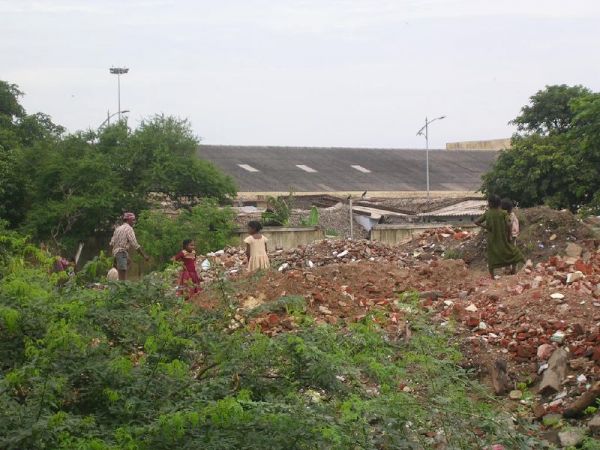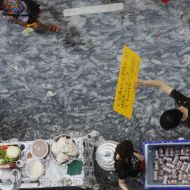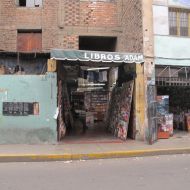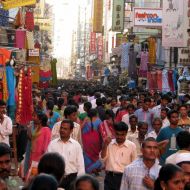Rich and Poor Mingling, Hourly Trash Pickup and Other Radical Visions for Chennai

Waste management, environmental degradation and a shortage of housing were just some of the issues discussed at Chennai’s scenarios workshop. Photo credit: Michael Coghlan via Flickr Creative Commons
The Rockefeller Foundation’s Informal City Dialogues project recently completed its first series of workshops in all six of the cities participating. In these initial workshops, attendees were asked to participate in developing “futures” for their city. Please click here to learn more about the process, and find out what will take place in upcoming workshops.
A little boy, his father an engineer, invites a little girl, her grandmother a waste-picker, to come see a magic show with his family. This scenario may seem simple. But in the Chennai of 2013, the idea of an engineer’s family amicably coexisting with a former waste-pickers’, without any prevailing class differences, is indeed radical.
In the Chennai of 2040, however, it may not be. Nor would the notion of every household getting ponni rice (a fine variety) for free, and home-delivered at that. Or the concept of youth having the freedom to choose their own partners instead of their parents arranging their marriages.
These were but a few aspects of a futuristic Chennai that Team Rajnikanth came up with at the recent Scenario Planning Futures Workshop.
As part of a Consultation on Waste, Informal Workers, and the Future of Chennai, we at Transparent Chennai – in association with the Madras Institute of Development Studies and the Global Alliance for Incinerator Alternatives — hosted the workshop following two weeks of field research under Chennai’s roasting sun. The gathering brought together planners, academics, journalists, organizers, city bureaucrats and workers – both formal and informal – including many people involved with Municipal Solid Waste Management (MSWM) in Chennai. These participants gathered to create scenarios for Chennai’s futures to explore the forces driving or resisting change in this fast-growing city.
But Team Rajnikanth? Named after the superstar actor? What has he got to do with waste? Ah! Patience. Let me tell you.
Aided by workshop facilitator and futures expert Tanja Hichert from South Africa, participants created a game board based on the challenges and issues faced by Chennai. The process began with the participants putting together a timeline of developments and changes internationally, nationally and specific to Chennai from 1950 to the present day, listing all the most important events and transformations. They included political events like the Emergency under Indira Gandhi’s rule and natural disasters like the tsunami, as well as aspects of life in an earlier Chennai that no longer exist, such as the large number of seasonal lakes that once dotted the city and the ability to walk on the roads safely.
We then discussed the problems faced by present day Chennai and those that might exist in the future, such as degradation of the environment (water bodies specifically) and the shortage of housing. After listing these issues, the two most important were chosen based on their impact and uncertainty. These two chosen issues – the ability of the government to cope with change and its propensity for government policies to favor the rich / poor – became the axes for our game board. With these as the coordinates, we would generate four plausible scenarios of the future, as described below. The participants jointly named each possible future and divided into four teams to develop detailed story lines for each.
Team Rajnikanth, named after the most famous of Tamil actors, was tasked with coming up with a vision of a near-perfect future (true to the actor’s image!): A pro-poor government that was excellent at coping with change. It was fun to see middle-aged Kamala, a representative of a grassroots women’s organization who is fondly called Kamala Acca (older sister) breaking into songs from Rajnikanth’s movies that reflected the utopian narrative. She quoted Rajni’s well-known one-liners such as En vazhi thani vazhi (“My way is a unique way!”), adding to the energy and spirit of an inherently forward-thinking process.
We delighted in making our translator redundant in 2040, as everyone would be educated and fluent in many languages, including English. Such a sport that she is, she joined in on the fun.
After coming up with our respective features of 2040, each team presented its visions to the others. Team Rajnikanth, for instance, had chutes in all buildings, where a flip of a switch would segregate waste into the right bins – to be carted away EVERY HOUR. The Chennai Corporation officials just could not control their laughter imagining that scenario.
In the 1980s, when it took years to get a landline phone connection, no citizen would have imagined that within a couple of decades, most of us would be using mobile phones. None of us foresaw the vast changes in the country’s and the city’s landscape and in the personal domain that economic liberalization policies would bring. After attending the scenarios workshop, I have come to realize that the government might have been better prepared to cope with these drastic changes had it utilized the scenario-planning method. This method takes different possibilities, variables and uncertainties into account, making one better prepared to deal with change.
The creative process led to some novel visions of the future, as well. I, for one, would never have imagined a left rule in Tamil Nadu, where only the two Dravidian parties have been ruling as far back as I know. But lo and behold, that plausibility emerged during the scenario narrative exercise. Aspects of future scenarios like the rich recycling all their waste and pollution-free bodies of water seemed unbelievable at first. But given past experiences and the fact that the scenarios are built on facts and various combinations of expected changes, it now seems that, yes, they are indeed possible.
Chennai faces many challenges – for us, waste management is at the forefront. The scenarios workshop covered a range of issues affecting the city – a hallmark of the futures scenario planning process. Given the future scenarios we created, the lessons from the workshop, and the inspiring waste management solutions in Pune, Bangalore and Mumbai that we learned about, we feel confident that innovative and sustainable solutions for waste management will emerge through cooperative effort and careful planning, making for a very bright future indeed.
This post was written by Jency Samuel and adapted from a more detailed blog post that can be found on Transparent Chennai’s website. Please click here to read the original post.









